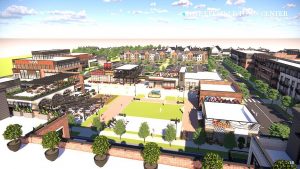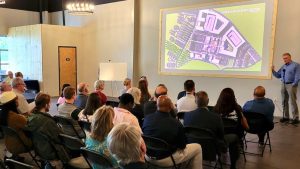Will there be life for redevelopment in Fayetteville after last week’s defeat of the move to have selected areas of the city qualify as a Tax Allocation District (TAD)? For now the city will continue to look at other possibilities and perhaps put the initiative on the ballot sometime in the future.
“We’ll have to talk with the council to see if they want to put it on the ballot next year. And we would also have to educate the public better than we did,” City Manager Joe Morton said Monday. “For now, we’ll keep exploring any tools, any kind of incentive that we can find for redevelopment.”
The redevelopment issue on the July 20 ballot was defeated 52.87 percent to 47.13 percent, or 1,168 votes to 1,041.
The redevelopment measure before voters would have essentially given the city the ability to try to move ahead with projects in blighted, distressed or deteriorating areas such as the 692 Shopping Center and the Fayette Place Shopping Center, both located on North Glynn Street, and potentially the Market Place at Lafayette, an undeveloped portion of the Villages at Lafayette situated along Ga. Highway 54.
“The TAD would have been a nice tool to have,” said Morton, noting that Fayette Place and the 692 Center are currently borderline properties in terms of new development. “The TAD would have helped them become financially viable.”
Morton noted that neither the city nor city affiliates such as a development authority can promote a TAD referendum. Such activities are limited to independent organizations such as a chamber of commerce.
A TAD is not a new tax but rather a diversion of existing taxes in a specific geographic area to be used for redevelopment purposes. TAD property taxes can also be used to pay on any public or private bond that might be associated with the TAD project.
Financing for a TAD comes as the tax base for the project area is frozen to form a base valuation, with property taxes used to pay eligible infrastructure-affiliated redevelopment costs. Bonds may also be issued to help finance projects.
Subsequent annual tax revenues in the project area are used to fund the city’s portion of the redevelopment.
Redevelopment powers will not change the existing method of setting property taxes. TAD financing does not rely on tax increases from properties that are not subject to redevelopment and apply only to those property owners who choose to have their land included within the TAD area.












Leave a Comment
You must be logged in to post a comment.